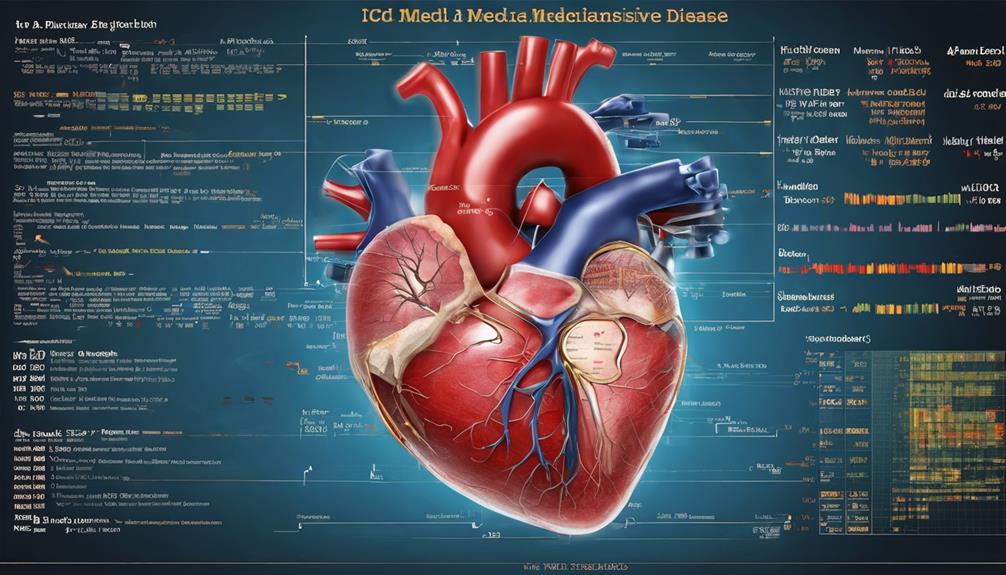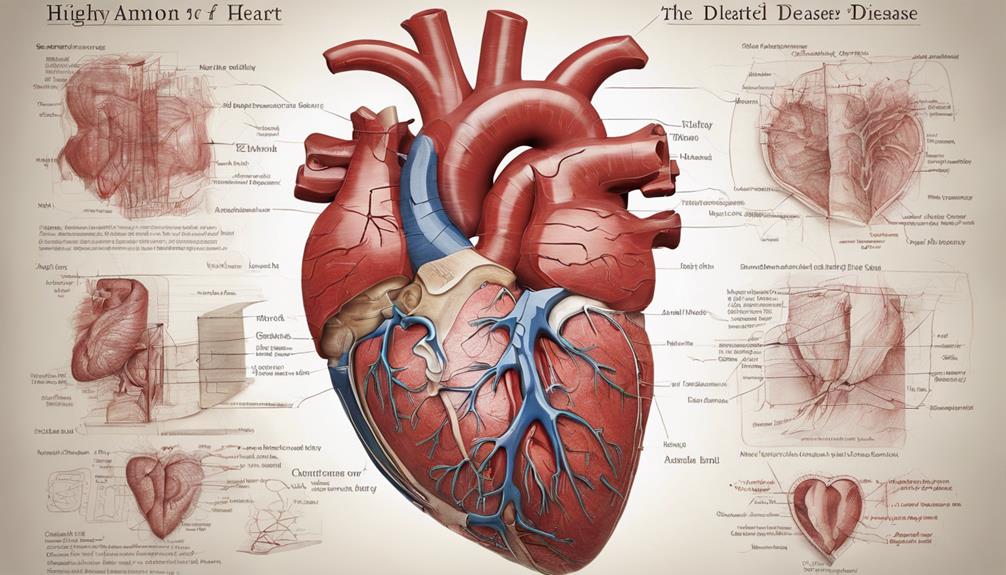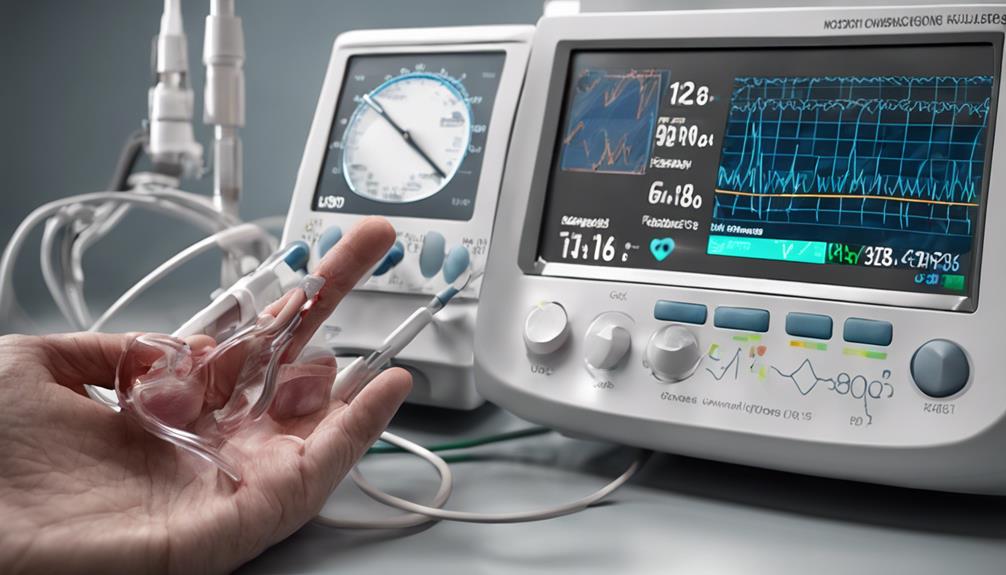While delving into the world of ICD-10 coding for Hypertensive Heart Disease, we discover the complex correlation between hypertension and heart failure symbolized by the code I11.0. This specific code plays a vital role in bridging the gap between these conditions, leading us to a more profound comprehension of the fundamental connection.
Understanding the nuances of this code not only shapes our approach to billing and patient care but also paves the way for more accurate diagnoses and treatment strategies. The implications of proper coding in this context are far-reaching, influencing both clinical outcomes and reimbursement processes.
Key Takeaways
- ICD-10 code crucial for billing accuracy and treatment tracking
- Accurate documentation prevents claim denials and reimbursement issues
- Differentiate between conditions for proper coding and treatment
- Early detection and intervention vital for hypertensive heart disease prevention
Overview of Hypertensive Heart Disease
In hypertensive heart disease, high blood pressure impacts the heart's structure and function. This condition can progress to heart failure, where the heart is unable to pump blood effectively, leading to symptoms like fatigue, shortness of breath, and swelling in the legs. Hypertensive heart disease is a significant risk factor for developing coronary artery disease and other cardiovascular complications.
Diagnosis of hypertensive heart disease involves monitoring blood pressure levels, assessing heart function through tests like echocardiograms, and evaluating for any signs of damage to the heart muscle. Symptoms such as chest pain, irregular heartbeat, and dizziness may prompt further investigation.
Treatment strategies for hypertensive heart disease focus on managing blood pressure levels within a healthy range to reduce strain on the heart. Lifestyle modifications, such as a heart-healthy diet and regular exercise, are essential. Medications to control blood pressure and prevent complications are often prescribed, along with close monitoring to track progress and address any emerging issues promptly.
Importance of ICD-10 Code

Using the appropriate ICD-10 code for hypertensive heart disease is critical for accurate medical billing and treatment documentation. This specific code helps healthcare providers and insurance companies identify and track the condition, ensuring proper reimbursement and quality care. Clear documentation supports accurate coding by outlining the relationship between hypertension and heart disease, aiding in selecting the correct code for each patient.
Understanding this connection is crucial for precise coding, as it reflects the severity and complexity of the condition. Incorrect coding can lead to claim denials and reimbursement issues, impacting both the healthcare provider and the patient. Adherence to coding guidelines is essential for maintaining consistency and accuracy in medical records, promoting better patient outcomes.
Coding Guidelines and Specificity
To ensure accurate coding for hypertensive heart disease, understanding the specific guidelines and codes related to this condition is essential. When documenting hypertensive heart disease without heart failure, the appropriate ICD-10 code to use is I11.9, which falls under the Diseases of the circulatory system category as designated by the World Health Organization (WHO).
It's crucial to document the condition accurately to distinguish between hypertensive heart disease with and without heart failure. Familiarizing oneself with the chapter-specific guidelines and Excludes notes is vital for the correct application of code I11.9. Additionally, crosswalks to ICD-9-CM codes are available for reference when coding hypertensive heart disease without heart failure, aiding in the seamless transition between code sets.
Clinical Manifestations and Diagnosis

Clinical manifestations of hypertensive heart disease typically present with left ventricular hypertrophy, diastolic dysfunction, and symptoms indicative of heart failure. Patients may experience shortness of breath, fatigue, and edema due to impaired heart function.
Diagnosis involves evaluating blood pressure levels, conducting echocardiography to assess cardiac structure and function, and excluding other potential causes of heart disease. Complications of hypertensive heart disease can include arrhythmias, myocardial infarction, and sudden cardiac death.
Management strategies focus on controlling blood pressure, implementing lifestyle modifications, initiating medication therapy, and monitoring for complications. Early detection and intervention are crucial in preventing disease progression and reducing the risk of adverse outcomes.
Treatment Strategies and Prognosis
Treatment strategies for hypertensive heart disease encompass lifestyle modifications, medication management, and blood pressure control to mitigate the risk of heart complications. Lifestyle changes such as adopting a heart-healthy diet low in sodium, regular exercise, weight management, and smoking cessation play a crucial role in managing hypertension. Medications like ACE inhibitors, beta-blockers, diuretics, and calcium channel blockers are commonly prescribed to control blood pressure and reduce strain on the heart. Monitoring blood pressure levels regularly and adhering to prescribed treatments are vital for effective management.
| Treatment Strategies | Description |
|---|---|
| Lifestyle modifications | Includes dietary changes, regular exercise, weight management, and smoking cessation. |
| Medication management | Involves the use of medications like ACE inhibitors, beta-blockers, diuretics, and calcium channel blockers. |
| Blood pressure control | Focuses on monitoring blood pressure levels consistently and following prescribed treatment plans. |
Prognosis for hypertensive heart disease varies depending on factors such as hypertension severity, comorbidities, and treatment adherence. Early diagnosis, proper management, and collaborative care among healthcare providers can significantly improve outcomes and prognosis for individuals with hypertensive heart disease. Regular monitoring and adjustments to treatment plans are essential for optimizing long-term prognosis.
Frequently Asked Questions
What Is the ICD-10 Code for Hypertensive Heart Disease Unspecified?
We'll provide you with the ICD-10 code for hypertensive heart disease unspecified. It's essential for accurate classification and billing.
Ensuring proper coding, like using I11.9, is crucial for treating and tracking cases effectively. Accurate use of this code aids in managing hypertensive heart disease cases without heart failure.
What Is the 2023 ICD-10 Code for Hypertensive Heart Disease?
We've got the answer you need!
The 2023 ICD-10 code for Hypertensive Heart Disease without heart failure is I11.9. This code, part of the Circulatory System Diseases category, covers heart conditions stemming from hypertension, minus heart failure.
It's crucial for accurate coding and billing in healthcare. Understanding I11.9 is key for proper documentation and treatment planning. Trust us; correct use of this code is essential in healthcare settings.
What Is the ICD-10 Code for Hypertensive Heart Disease Without Heart Failure and Ckd?
We use code I11.9 for hypertensive heart disease without heart failure and CKD. This code categorizes cases of hypertensive heart disease that don't involve heart failure or chronic kidney disease.
Accurate coding with I11.9 ensures proper documentation and classification. Understanding ICD-10 guidelines is crucial for correctly identifying and recording instances of hypertensive heart disease without heart failure and CKD.
What Is Hypertensive Heart Disease?
Hypertensive heart disease is a condition where high blood pressure affects the heart's structure and function. It can lead to complications like heart failure, coronary artery disease, and arrhythmias. Symptoms include chest pain, shortness of breath, fatigue, and leg swelling.
Management involves lifestyle changes and medications to control blood pressure. Untreated, it can increase the risk of heart attacks, strokes, and heart failure.
Conclusion
In conclusion, the importance of accurate coding for hypertensive heart disease can't be overstated. Without proper documentation, the link between hypertension and heart failure may go unnoticed, leading to potential complications in patient care.
So let's all remember to code diligently and ensure that the heart and hypertension are always in sync on paper, even if not in reality.









